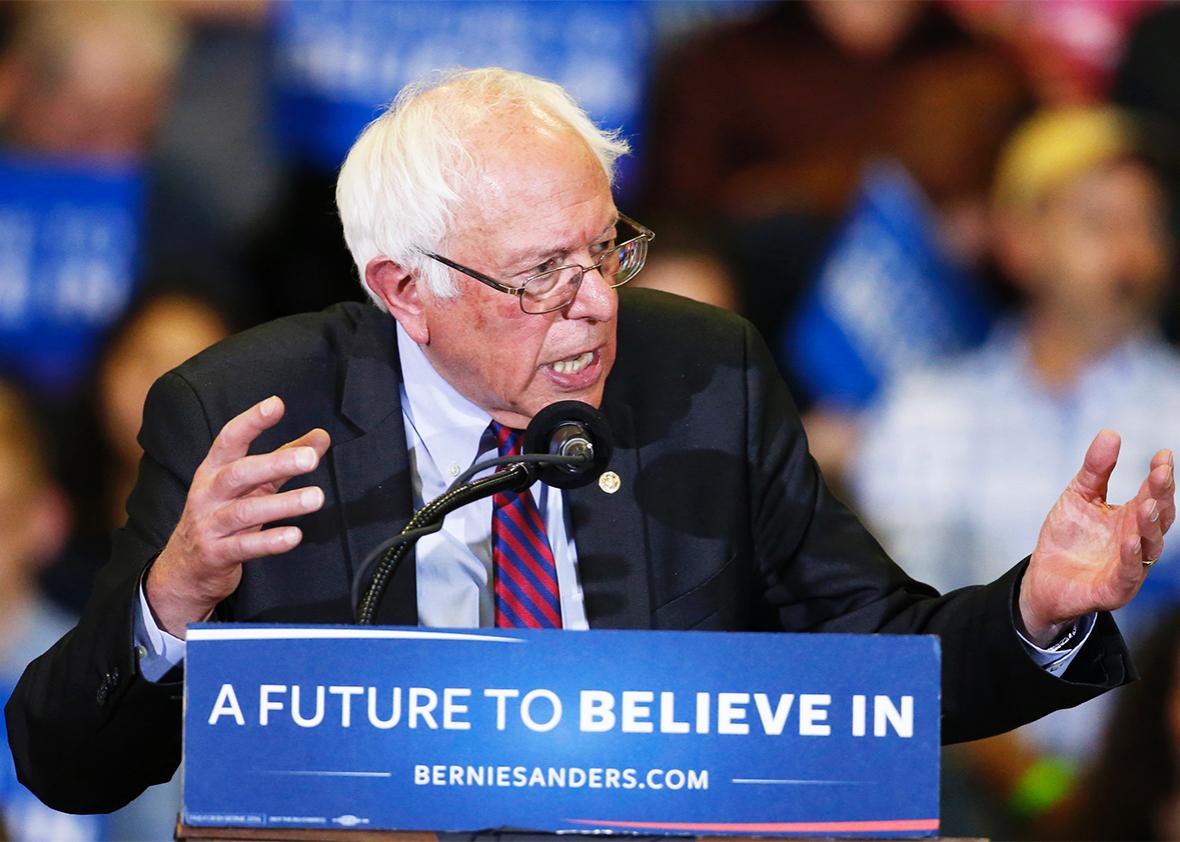No Democrat would ever insist Bernie Sanders drop out of the race, Sen. Sherrod Brown told Politico this week. “I don’t think any Democrat should call on him to get out,” he said. “Almost no Democrat I know would say that. And shouldn’t.”
The Democrats won’t force him out of the race, no; they’ll just smother him with smarmy condescension.
Sen. Claire McCaskill, for instance, tells Politico that “what’s important is not whether or not he gets out, but how he campaigns. If the contrast is now about what separates us from Donald Trump, then I think it’s fine.” Did you hear that, Sanders? You have McCaskill’s permission to continue campaigning as long as you only speak about how Democrats are better than Donald Trump. “It’s good [for Sanders] to continue to raise the concerns that people have,” Sen. Jeanne Shaheen says, similarly, “but I think it ought to be in the context of, ‘This is the difference between the Democrats and Republicans in this race.’ ” It’s unclear where either McCaskill or Shaheen got the perception that Sanders is campaigning to be the rapid-response director of the Democratic National Committee. And it’s also not as if Sanders has been especially vicious with Clinton this race.
Sanders isn’t going anywhere, and since he’s still in the race, he’s going to keep trying to win states. He won two of them Tuesday night. Though Hillary Clinton took the big catch—Arizona—Sanders was able to net the most delegates on the night. Clinton’s 58 percent to 40 percent victory in Arizona netted her 15 delegates over Sanders, while Sanders’ blowouts in Utah and Idaho netted him 31. Net the nets and Sanders trimmed into Clinton’s delegate lead by 16.
Sanders’ good night, however, makes him only 5 percent less finished than he was before the night began—which was pretty finished. He still trails Clinton by 303 pledged delegates, per the Associated Press, and he’s running out of states. His extremely narrow chance for besting Clinton in the final pledged count still rests on thumping her in large contests such as New York, Pennsylvania, and California. In the short term, he can continue making gains—and maintaining a pulse in the media narrative—with favorable upcoming contests in Alaska, Hawaii, Washington, Wisconsin, and Wyoming.
Sanders needs a medium- to large-sized miracle to overcome Clinton. But as long as he’s not mathematically eliminated and his campaign still has money, there’s no reason for Sanders to drop out—not this far into a process that no one figured he’d survive past Super Tuesday. Sanders has earned the right to finish out his candidacy, just as Clinton had in 2008.
The question within the Democratic Party is more about how he should campaign for the remainder of the primary season. This is where the problems come in. Sanders and his supporters, of course, would like to continue campaigning aggressively in order to win or at least to keep the heat on Clinton. Clinton and her supporters, which include the vast majority of the Democratic Party apparatus, would like Sanders to back the hell off and not put her in any uncomfortable positions.
Putting Clinton in uncomfortable positions is exactly what Sanders wants to do. His continued presence in the race performs the valuable service of cornering her into commitments she otherwise may not feel comfortable making. In other words: He pulls her to the left. This is simultaneously why Sanders won’t stop competing against Clinton one second before he’s required to and why the Democratic Party apparatus would like him to stop competing with her altogether.
Consider what would have happened had Sanders dropped out before the last debate in Miami. There would have been no debate, duh. And if there hadn’t been a debate, Clinton would never have been cornered into pledging not to deport any children or any adults without criminal records. That was an extremely important moment for progressive immigration reform activists and not a commitment she would have made in a vacuum. Two Democratic debates remain.
These are the sorts of positions that begin to give Democratic leaders the willies. Sure, the entire party has moved leftward on immigration in recent years. Not every elected Democrat, though, will be pleased to defend his or her party standard-bearer’s position that only criminal adults should be deported. And party operatives will worry that this position veers too far from the center.
This is why the likes of McCaskill and Shaheen would like Sanders to spend the remainder of his time speaking exclusively about how Trump is a jerk rather than pressuring Clinton into making more commitments with which the center may be uncomfortable. They’re asking Sanders to continue running for the nomination without really running for the nomination. It doesn’t work that way.
See more of Slate’s Democratic primary coverage.
